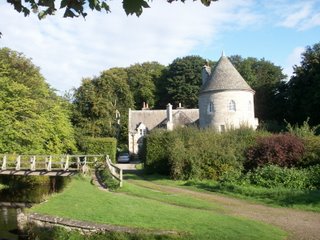
In an age where doctrine and understanding had primarily been handed over or handed down through Divinity Colleges, questioning the stance of the establishment was seen as weak faith or ungodly. Irwing, Erskine and Campbell, continued to debate the person of Christ, the nature and scope of Atonement, election and eternal punishment, and the gifts of the Holy Spirit. It is evident that many churchmen seeking the closer spiritual life saw something in Irwing that appealed to them, yet their education and influence did not allow them to enter in.
Around 50 people were meeting in Henry Drummond's house at Albury, to study the prophetic books of the Bible. Out of these meeting came, in time, the Catholic Apostolic Church. Two things that were in the forefront of concern at these meetings in Albury, were:

Mary Campbell, an invalid, in Row, Gairloch,Port Glasgow one Sunday in March, of 1830, broke out into speaking in tongues of an unknown language for about an hour. Margaret Macdonald, an acquaintance, was aided to health by her brothers, James and George Macdonald, of Port Glasgow. They wrote to Mary Campbell and the same thing happened to her. Erskine and friends, Robert Story, and Macleod Campbell, Ministers in the Gairloch area, went to check out Mary Campbell's circumstances. Erskine, convinced, for the time being, put to paper "the gifts of the Holy Spirit" at the end of that same year. Erskine, later retracted his conviction that these happenings were identical to those mentioned in the book of Acts. Most interestingly, he did say "I still continue to think, that to anyone whose expectations are formed by, and founded on the declaration of the New Testament, the disappearance of these gifts from the Church, must be a greater difficulty than their reappearance could be". Here we have an acknowledgement of a loss to some of the Christian practice of the New Testament and recognition that it was still required. He concluded more difficult to comprehend the loss of the gifts than the reappearing of them.
Around 50 people were meeting in Henry Drummond's house at Albury, to study the prophetic books of the Bible. Out of these meeting came, in time, the Catholic Apostolic Church. Two things that were in the forefront of concern at these meetings in Albury, were:

- Gifts of the Holy Spirit as seen at Pentecost.
- Expectation of the second Coming, in the near future.
Mary Campbell, an invalid, in Row, Gairloch,Port Glasgow one Sunday in March, of 1830, broke out into speaking in tongues of an unknown language for about an hour. Margaret Macdonald, an acquaintance, was aided to health by her brothers, James and George Macdonald, of Port Glasgow. They wrote to Mary Campbell and the same thing happened to her. Erskine and friends, Robert Story, and Macleod Campbell, Ministers in the Gairloch area, went to check out Mary Campbell's circumstances. Erskine, convinced, for the time being, put to paper "the gifts of the Holy Spirit" at the end of that same year. Erskine, later retracted his conviction that these happenings were identical to those mentioned in the book of Acts. Most interestingly, he did say "I still continue to think, that to anyone whose expectations are formed by, and founded on the declaration of the New Testament, the disappearance of these gifts from the Church, must be a greater difficulty than their reappearance could be". Here we have an acknowledgement of a loss to some of the Christian practice of the New Testament and recognition that it was still required. He concluded more difficult to comprehend the loss of the gifts than the reappearing of them.